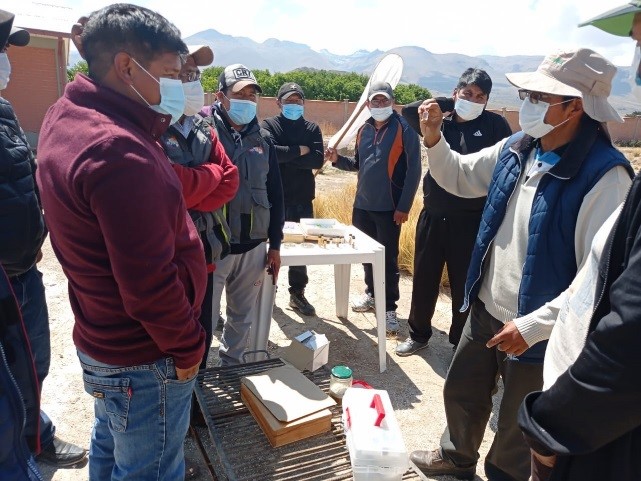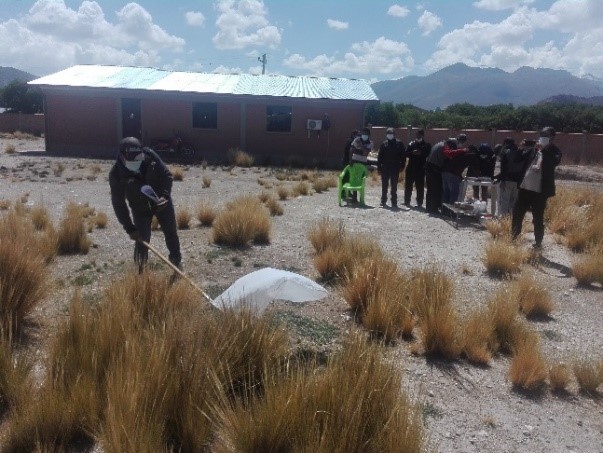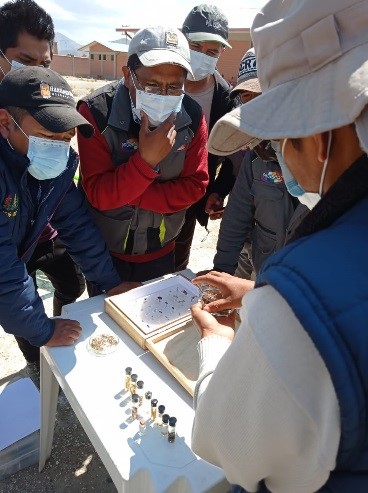Locally and online, a new way of providing advisory services
30-11-2020Bolivia - One of the main challenges Royal Quinoa farmers in the Southern Highlands of the country are currently facing is how to increase their yield as a result of the application of the best management practices. For this reason, the efficient management of pesky insects is vital to contribute to increasing yield and reducing crop production costs. During the last two months, Agriterra has been collaborating with the National Association of Quinoa Producers (ANAPQUI), with an advisory service on "Recognition of Pesky Insects in Quinoa" as part of a joint effort to improve the productivity of the farmers.
The content of the counselling training was developed based on previous experiences and the review of existing literature on the subject by the expert in charge, Reinaldo Quispe, in direct coordination with the head of PROQUINAT (Eduardo Paye) and the business advisor of Agriterra (Alejandra Bazoberry). Because of health restrictions due to Covid-19, the training was organised in four sessions. The first three sessions took place in virtual mode through the Zoom platform. The fourth session, the practical part (training), was done in person for reasons of flexibility in time and space as well as responding to the needs, demands and expectations of the participants.
The face-to-face training was carried out at ANAPQUI (Challapata, Oruro). In this training, the recognition of the quinoa pesky insects was complemented with samples of insects in both larval and adult stages. The main participants were the technicians of the ANAPQUI base associations, the head of PROQUINAT and Edson Meneses, a consultant who also collaborates with Agriterra and ANAPQUI in another advisory service about bio-inputs.

Explaining about quinoa pesky
To complement the training, a manual was developed to facilitate the recognition of the quinoa pesky insects, which was validated in the last training session with the PROQUINAT technicians. At the end of the session, follow-up actions were planned for the collection of insects from the quinoa and the assembly of an insect sample set by ANAPQUI technicians.
A characteristic of ANAPQUI is its wide geographic coverage, since farmers are distributed between the departments of Oruro and Potosí. This characteristic makes it difficult for its associates (farmers) to access information, so for the outreach of information, the technicians of the ANAPQUI regionals play an important role. This structure will promote a greater dissemination of what the technicians have learned from quinoa farmers. Now that the training has ended, the specialised technicians will take the knowledge to be replicated to the regional offices they belong to and the area in which they will replicate the training and it is expected to reach 8 regionals or base associations in Oruro and 8 in Potosí.
This training was the first one with a different methodology because there was the combination of field work and work done online. The pandemic has brought us many challenges but also many new opportunities to adapt to a reality that is increasingly common, such as working digitally. In this case, it has been one of the first online training courses that the association has offered with the help of its technical team, supplemented with field practice and an in-person closing session, and it has been excellent.

Demonstration of the collection of insects to develop sample sets
As Agriterra, we will continue collaborating with our clients to improve the productive area and the efficiency in the different agricultural crops, taking care of the environment and especially promoting sustainable practices in the field, not only to increase productivity, but also to ensure quality.

